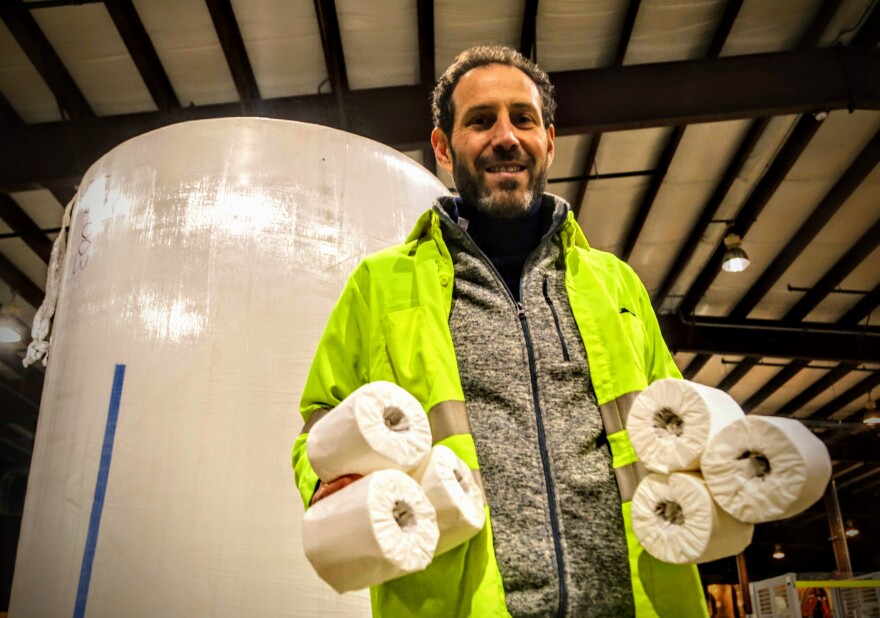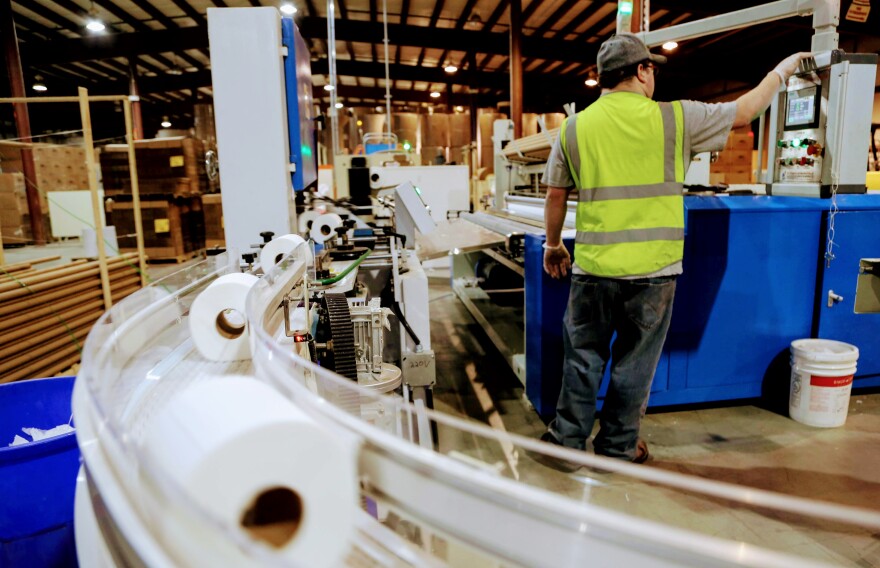The COVID-19 pandemic has led to the panic-buying of certain items, notably paper products - and toilet paper in particular. Some stores have sold out, others have resorted to rationing - in some cases to just one roll per customer. The sudden demand for what some are calling "white gold" is proving to be a challenge - and an opportunity - for one fledgling family business in a part of Maine that has struggled through hard times in the paper industry.
"It's been insane. I don't sleep much." And that's how it's been for Marc Cooper and his son Jake since their toilet paper start-up in Bangor, Tissue Plus, was launched into go-mode this month.
"So unfortunately, we weren't quite prepared for this to happen so quickly," Cooper says, "but we're doing our best to meet the demand. We've been very fortunate that there's been a good work force available."
Shouting over the factory din is Jeff Clement. "Try to make sure they go in there nice and straight. If they get crooked it'll mess everything up," he yells over the noise of a special machine - one we're not allowed to describe, and that does something we're not allowed to detail because they are trade secrets.

Clement says he spent 30 years working at the mill in Bucksport before it shut down six years ago. The availability of veteran paper workers like Clement is one reason that Cooper, who hails from Massachusetts, decided to head north a year ago and invest his life savings in an empty 100,000-square-foot building in Bangor.

Cooper had to buy - and design - new equipment, and fit the space for what he was trying to accomplish. In all, he says the endeavor has cost almost $2 million. But this was before anyone had even heard of COVID-19.
"You definitely can't argue with the timing, for sure, but we've been working on this project for about a year," Cooper says. "So we saw an opportunity in the area of tissue and toweling because it's a consumable product- people use it every day."
At the moment, Cooper employs 20 full-time workers. One of them is Peter Hamel, who spent 37 years at the Georgia Pacific mill in Old Town before it shut down in 2006. Hamel says he never thought he'd see a new paper plant come online in the area, but he's hopeful.
"I think we're gonna make it," he says. "It's an opportunity and it's good for the area, bring employment into the area."
Jennifer Mitchell: "Right now you're making probably one of the most popular products on the planet."
Peter Hamel: "Oh yeah. Don't know why, but people are hoarding it up."

Currently, Tissue Plus is churning out toilet tissue and paper towels 18 hours a day. Owner Marc Cooper says he recently started running all weekend to meet demand from the state's prison system. And daily inquiries are pouring in from all over.
"I actually received an inquiry from the country of Iceland yesterday, grocery store chains from Florida, distributors from around the country," Cooper says. "The demand for toilet paper is insane."
But so far, local demand is unspooling every roll as fast as workers can wind them. At capacity, the plant should be able to make 80 rolls per minute, round the clock, but Cooper says he needs another 15 to 20 workers to do that.
Right now, he's brainstorming ideas to try and generate more capital so he can hire them - including the launch of a direct to consumer toilet paper subscription service.

And he's not the only one in the family who has been burning the midnight oil in recent weeks. "A lot of kids in college have not faced a lot of adversity in their lives," says Cooper's son, 20-year-old Jake. Jake is also working overtime to get the new plant rolling, in addition to attending college full time.
He says he and his father have been staying up until 3:00 a.m. to make sure tissue gets into the supply chain. Jake says impacts from the COVID-19 pandemic will likely offer his generation some lessons about making things work under tough circumstances - and he says he's learning something about team work and balancing obligations.

"We have been able to find ourselves donating to shelters or pantries and keep our employees paid," he says. "I mean, definitely it's a little bit of a boost to show that we can actually help the community, and I think that's the most rewarding factor of it."
But new businesses are notoriously unprofitable. Marc Cooper says they've seen money "go in one direction" for the last 12 months - that is, out.
But there are hopeful signs. He says in February, Tissue Plus was already almost breaking even. And March? He says with the solid demand coming from every corner of the globe he's predicting they will break even - and maybe even turn a small profit.
Originally published 8:55 a.m. March 27, 2020.





